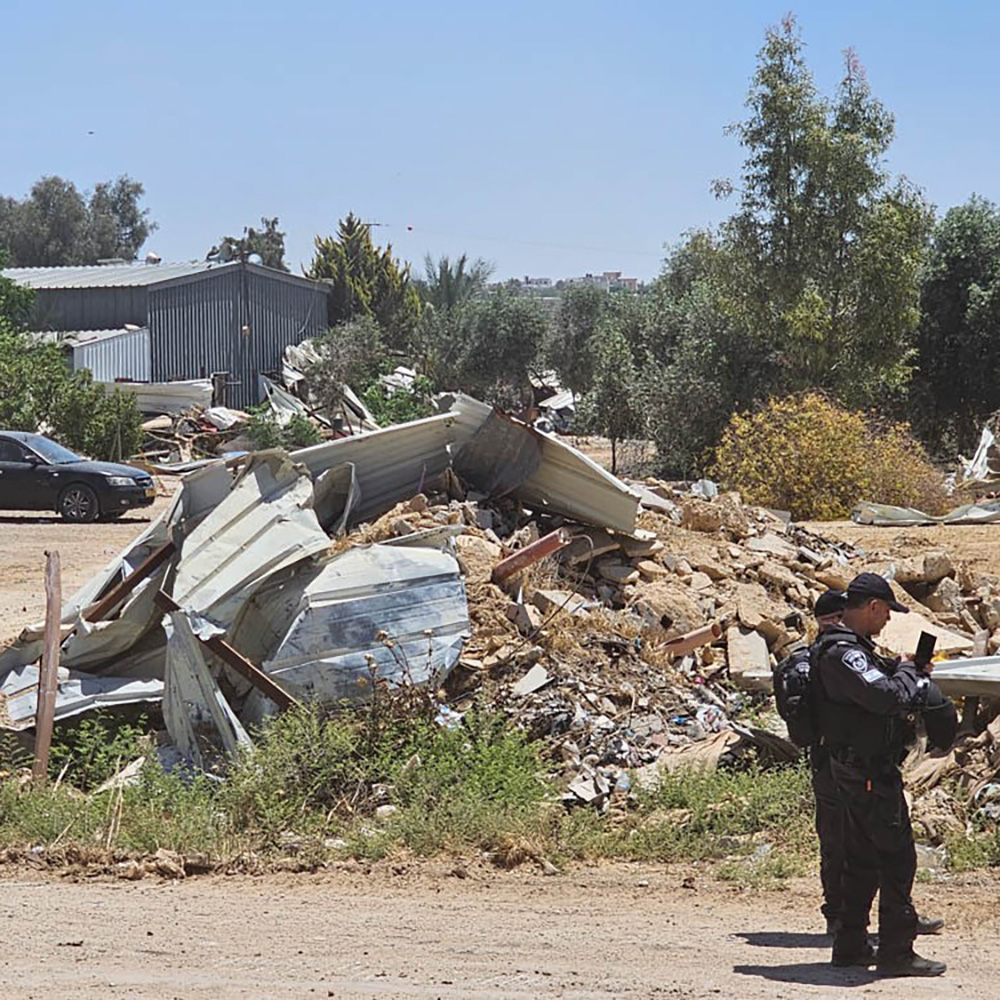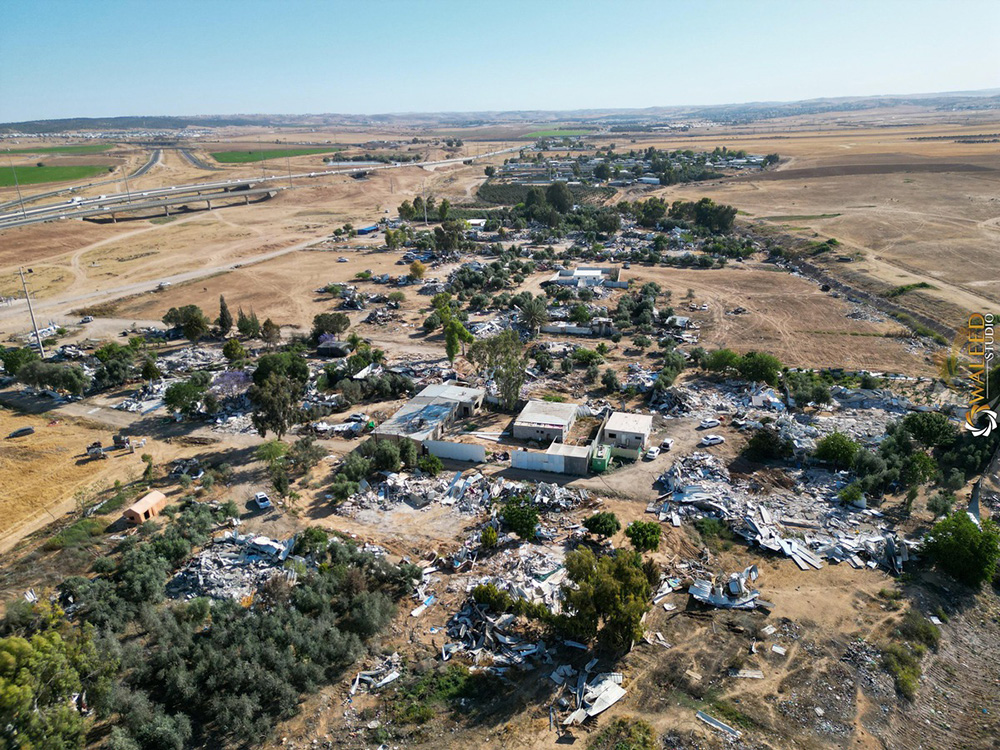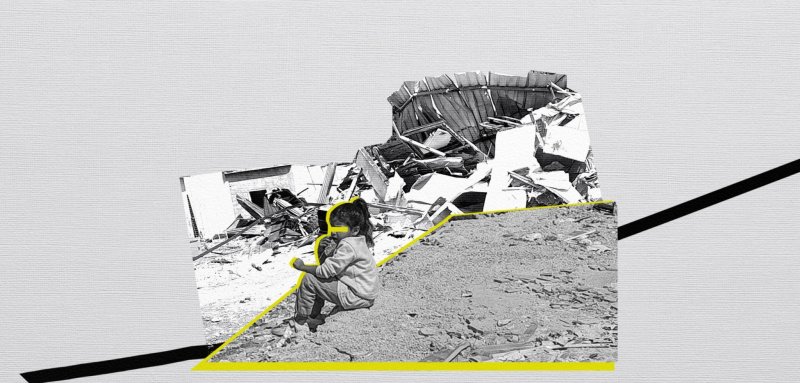It seems that neither its ongoing genocide of Gaza, nor the charges brought against it by the highest international judicial bodies, deterred Israel from committing further crimes within the West Bank and the Palestinian interior.
In early May 2024, the Negev (Naqab) desert in the south witnessed one of the largest demolition operations in the 1948 territories since the Nakba. It involved the demolition of 75 homes in the unrecognized village of Wadi al-Khalil, under the pretext of unlicensed construction.
Over the course of eight hours, Israel displaced over 320 Palestinians from their homes in Wadi al-Khalil, one of 36 Bedouin villages in the Negev that the Israeli authorities do not officially recognize.
It seems that neither its ongoing genocide of Gaza, nor the charges brought against it by the highest international judicial bodies, deterred Israel from committing further crimes within the West Bank and the Palestinian interior.
But the Israeli plan to expand Highway 6, the longest road in Israel connecting north to south, at the expense of Bedouin lands and their properties, did not escape the Negev Palestinians.
This plan is part of Israel's comprehensive policy to ethnically cleanse the Negev and displace its indigenous inhabitants, in a clear attempt to completely Judaize the area. This policy began when Haganah gangs and militias expelled around 100,000 Palestinians, of the 111,000 original inhabitants, during the Nakba.
The policy continues to this day, depriving the indigenous Negev residents of their basic rights, and refusing to recognize 36 villages which lack even the most basic of necessities, such as electricity, water, and medical and access to educational services.
Around a 100,000 Palestinians live in these unrecognized villages, threatened on a daily basis with displacement, the demolition of their homes, and are regularly plunged into poverty and unemployment.
In early May 2024, the Negev (Naqab) desert in the south witnessed one of the largest demolition operations in the 1948 territories since the Nakba. Over the course of eight hours, Israel demolished 75 homes and displaced over 320 Palestinians from their homes in the unrecognized village of Wadi al-Khalil, under the pretext of unlicensed construction.
A Palestinian presence at the mercy of settlers
The village of Wadi al-Khalil, most of which has been demolished by Israel, is situated on one of the main ancient trade routes which connected Beersheba (Be'er Al Sabea') and Hebron (Al-Khalil) before the Nakba. Mandate maps indicate the village as a major landmark in the region.
An area that once held strategic significance for Palestinians has turned into an unrecognized and afflicted village.
Suleiman Abu A'sa, one of the Palestinians whose home was demolished, tells Raseef22, “It was a massacre of homes. Such a demolition operation has never occurred in the history of the state of Israel. We are talking about more than 120 homes and buildings. An earthquake couldn't cause all this destruction. They wiped out an entire neighborhood in one go. Just like they do in Gaza.”
“It was a massacre of homes. Such a demolition operation has never occurred in the history of the state of Israel. We are talking about more than 120 homes and buildings. An earthquake couldn't cause all this destruction. They wiped out an entire neighborhood in one go. Just like they do in Gaza.”
He adds, “There were infants and elderly people left standing under the scorching sun and extreme heat. My mother is ninety years old. I have sons, daughters, and grandchildren, and we all currently live in my son's house, which also received a demolition notice.”
Abu A'sa insists that the justification provided by governmental institutions is based on lies and slander. Israel’s actions are a collective punishment of the Negev Bedouins, as they remain persistent in demanding fair rights. “After hours of continuous demolitions, about 700 policemen showed up to incite chaos and provoke us. And after a few days, they demolished the tents we had set up and uprooted the trees. If their justification is unlicensed construction, do these trees also need permits?” Abu A'sa asks.
 Israel demolished hundreds of Palestinian homes in the Negev for the sake of building one road
Israel demolished hundreds of Palestinian homes in the Negev for the sake of building one road
In 2007, Israel established The Authority for Development and Settlement of the Bedouin in the Negev and granted it exclusive authority over all matters related to planning and construction in Palestinian villages and towns in the Negev. According to Juma Zabarqa, head of the Negev Bedouin Higher Steering Committee, “This authority has full power to issue administrative demolition orders without a court decision.”
"In the absence of a building committee for Arabs in the Negev, residents are forced to turn to the committee in Beersheba (Be'er Al Sabea'), where the majority of employees are settlers, with no Arab representation. Everything in regards to the Bedouins of the Negev passes through these racist governmental institutions. These systems exploit the pretext of unlicensed construction, for which they are the primary cause, to erase entire villages from the map"
Despite the authority name containing the word “development,” it seeks only to develop Jewish towns and projects, while neglecting and uprooting everything Palestinian.
Zabarqa tells Raseef22, “In the absence of a building committee for Arabs in the Negev, residents are forced to turn to the District Planning and Building Committee in Beersheba (Be'er Al Sabea'), where the majority of its employees are settlers, without any Arab representation in this committee. Everything in regards to the Bedouins of the Negev passes through these racist governmental institutions.”
These systems exploit the pretext of unauthorized or unlicensed construction, to erase entire villages from the map. The entire village of Abu Talul is at risk of demolition. Despite Israeli recognition, there are no licensed houses in it.
"They demolished the tents we had set up and uprooted the trees. If their justification is unlicensed construction, do these trees also need permits?”
An old uprooting policy
Galilee and the Triangle face a similar fate, according to Zabarqa. Israel has surrounded Palestinian residential communities with settlements or what it refers to as "national projects."
“What happened in Wadi al-Khalil aligns with these plans. The expansion of Highway 6 came at the expense of our lands. In fact, the state deliberately planned the route of the road to pass through the villages of the Negev,” Zabarqa confirms.
Jabr Abu A'sa, 55, tells Raseef22, “The Abu A'sa family has been living in these houses for over eighty years. So it's not about entitlement or licenses. Our eviction from our homes was for the sake of expanding Highway 6, a road that connects northern Israel to its south.”
The case of Wadi al-Khalil has brought to mind the village of Al-Araqeeb, which has become a symbol of the resilience of the Negev people. Since 2010, the occupation has been systematically demolishing the unrecognized village. Each time Israeli bulldozers destroy it, its people rebuild it. The latest demolition this year, on the 76th anniversary of the Nakba, marks the 225th demolition of Al-Araqeeb since 2010.
He adds, “Previously, Israel wanted to relocate us to what is known as Neighborhood No 1. However, there is a tribal dispute over that neighborhood. This is how the Israelis play their malicious games. They are interested in igniting internal conflicts and dragging our impoverished communities into rampant violence.”
The issue of home demolitions in the Negev is not new. But the scale of the most recent demolition that took place in Wadi al-Khalil was a surprise to Abu A'sa. “I received a call from the police at midnight, eight hours before the demolition operation was set to begin. At first, I thought the demolition would involve five or six houses, but I was shocked when I learned they intended to demolish the entire neighborhood,” he says.
Abu A'sa now lives with his family in the open. He and others have received notices and orders to demolish the tents they had set up next to the rubble of their homes. He comments, "Even if they demolish them a hundred times, we will remain in our homeland. What is happening to us is state terrorism being carried out against innocent people."
The case of Wadi al-Khalil has brought to mind the village of Al-Araqeeb, which has become a symbol of the resilience of the Negev people. Since 2010, the occupation has been systematically demolishing the unrecognized village. Each time Israeli bulldozers destroy it, its people rebuild it.
Since the start of this year, Al-Araqeeb has been demolished three times, most recently on the 76th anniversary of the Nakba. This latest demolition marks the 225th demolition of Al-Araqeeb since 2010.
Since the start of this year, the village of Al-Araqeeb has been demolished three times, most recently on the 76th anniversary of the Nakba. This latest demolition marks the 225th demolition of Al-Araqeeb since 2010.
 Israel demolished hundreds of Palestinian homes in the Negev for the sake of building one road
Israel demolished hundreds of Palestinian homes in the Negev for the sake of building one road
Entrenching apartheid
Apartheid policies are visibly taking shape in the Negev. The demographic changes in the Palestinian desert began before the Nakba, after 14 Jewish towns were established in the northern parts of the Negev in the 1940s. Today, there are 141 Zionist settlements, compared to only 7 Palestinian towns and 11 villages under recognition. Additionally, there are 35 other unrecognized villages.
These villages lack basic necessities such as infrastructure, medical centers, schools, and sewage systems. Inhabitants suffer from high poverty and unemployment rates, and Israel aims to drive these original inhabitants out, clearing the land out for settlers.
The apartheid system is further entrenched through plans to choke Arab areas and cut them off from their natural connections and extensions. “Military barracks are built between Palestinian villages, as happened between the villages of Umm Batin and Lakiya, to prevent communication between them,” says Zabarqa.
He adds, “There are 69 individual farms belonging to settlers in the Negev, established for ideological reasons, while there is not a single private farm owned by a Negev Palestinian, despite the historical connection Arabs have with the land and livestock. Now, the extremist Minister of National Security, Ben Gvir, claims that the Arabs of the Negev are invaders of Israel's land. In reality, there isn't a single Bedouin living on a meter of land here that isn't his.”
“There are 69 individual farms belonging to settlers in the Negev, established for ideological reasons, while there is not a single private farm owned by a Negev Palestinian, despite the historical connection Arabs have with the land and livestock. Now, the extremist Minister of National Security, Ben Gvir, claims that the Arabs of the Negev are invaders of Israel's land. In reality, there isn't a single Bedouin living on a meter of land here that isn't his.”
To understand how or why this has been unfolding in the Negev, we must remember the Zionist institutions operating there. In 1967, Ariel Sharon established the so-called Green Patrols under the pretext of guarding state lands. According to Zabarqa, these patrols confiscate the livestock of Palestinian residents, demolish their tents, destroy their crops, and impose fines under the pretext of their livestock grazing in "closed military areas."
“The Green Patrols are a racist institution, green for Jews and black for Arabs. Through them, the state seeks to encourage Jews to migrate to the Negev at the expense of the disfigured Arab towns. These towns have become like hotels, just places to sleep. Arabs go to work for Jews in the settlement of Netivot all day and only return to sleep in their villages.”
The apartheid system has continued to affect the lives of Negev Bedouins since the start of the Israeli war on Gaza. It is estimated that 7 Palestinians have died, because their houses were built of tin and they were prevented from building shelters.
Raseef22 is a not for profit entity. Our focus is on quality journalism. Every contribution to the NasRaseef membership goes directly towards journalism production. We stand independent, not accepting corporate sponsorships, sponsored content or political funding.
Support our mission to keep Raseef22 available to all readers by clicking here!
Interested in writing with us? Check our pitch process here!





